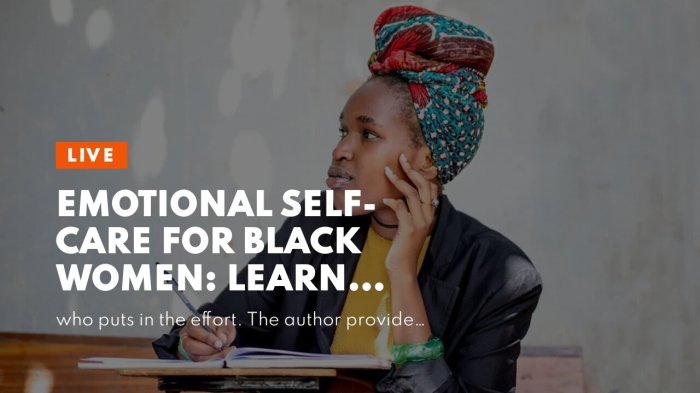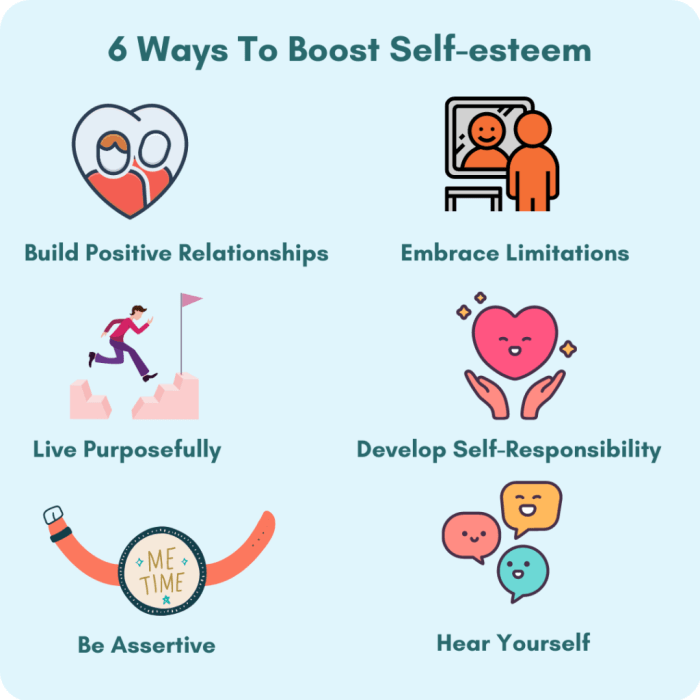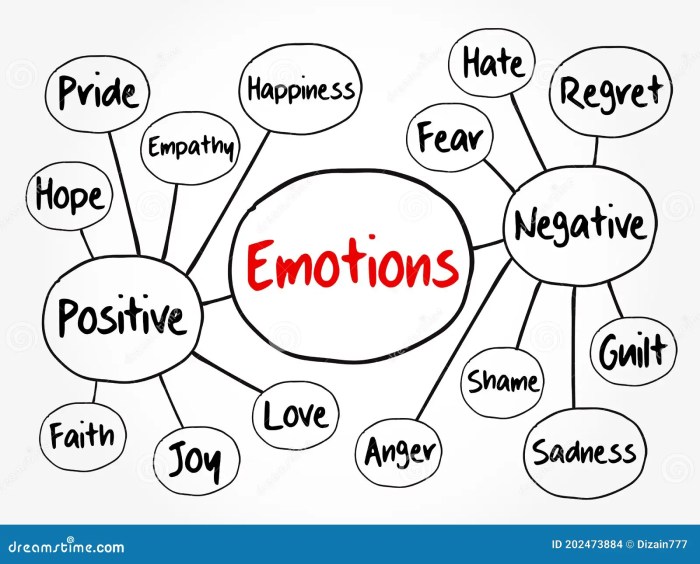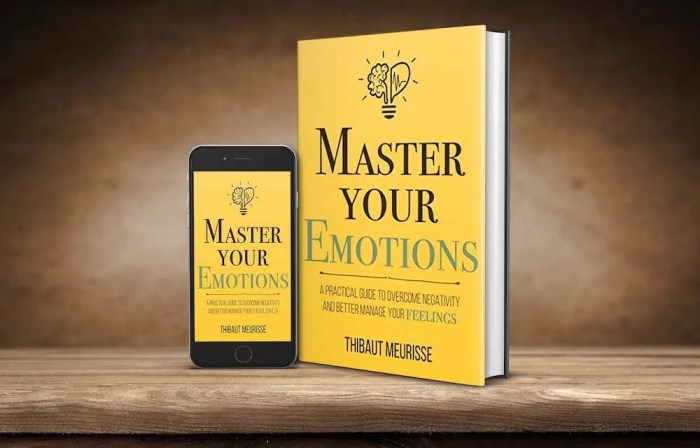Hey, Queen! Ever feel like you’re juggling a million things, and your mental health is taking a backseat? Girl, you’re not alone! Black women are strong, resilient, and often expected to handle everything with a smile. But real talk, we deserve to prioritize our emotional well-being, too.
This journey’s about taking back your power, mastering your emotions, and silencing those pesky negative thoughts. It’s about embracing your inner strength and building a life that truly nourishes your soul. So grab your crown, put on your fiercest lipstick, and let’s dive in!
We’ll explore the unique challenges Black women face, discover powerful strategies for self-care, and learn how to overcome past trauma and negative thought patterns. We’ll even peek into a book that can guide you on this amazing self-love journey.
Ready to unleash your inner queen and claim your power? Let’s get started!
Understanding the Need for Emotional Self-Care

Black women navigate a complex world, facing unique challenges that can significantly impact their mental and emotional well-being. From systemic racism and sexism to societal expectations and pressures, these experiences can take a toll on their overall health and happiness.
It’s crucial for Black women to prioritize emotional self-care as a vital strategy for navigating these challenges and fostering resilience.
The Impact of Societal Challenges on Black Women’s Mental and Emotional Well-being
The constant exposure to discrimination and prejudice can lead to chronic stress, anxiety, and depression. Black women are disproportionately affected by mental health issues, including higher rates of PTSD, anxiety, and depression. The intersection of race and gender creates a unique set of stressors that can impact their emotional well-being.
Why Emotional Self-Care is Crucial for Black Women’s Overall Health and Happiness
Prioritizing emotional self-care is essential for Black women to manage stress, cope with adversity, and build resilience. It’s a proactive approach to mental health that involves engaging in practices that promote emotional well-being. By prioritizing emotional self-care, Black women can cultivate a sense of agency, self-love, and empowerment, leading to a healthier and happier life.
Strategies for Emotional Self-Care

Girl, let’s talk about taking care of your mental health! Emotional self-care is about prioritizing your well-being and learning to manage your emotions. It’s about understanding your triggers, building resilience, and developing strategies to handle stress and anxiety.
Taking care of your mental health is like mastering a classic novel, it takes time, patience, and a deep understanding of the characters (your thoughts and emotions). Just like you can lose yourself in the pages of Hemingway’s “The Sun Also Rises” The Sun Also Rises Hemingway’s Famous Semi Autobiographical Fiction Novel – 20th Century Collector’s Edition Book (Annotated) , you can also find yourself through emotional self-care.
It’s about diving into your inner world, facing your demons, and emerging stronger and more confident.
Managing Stress and Anxiety
Feeling overwhelmed? It’s totally normal! Stress and anxiety are part of life, but there are ways to manage them. Here are some strategies that can help you keep your cool:
- Deep Breathing Exercises:When you’re stressed, your body goes into fight-or-flight mode. Deep breathing can help calm your nervous system. Try taking slow, deep breaths, inhaling for a count of 4, holding for a count of 4, and exhaling for a count of 4.
- Mindfulness Meditation:Mindfulness is about focusing on the present moment without judgment. It’s a great way to quiet your mind and reduce stress. You can find guided meditations online or try a simple mindfulness exercise: sit comfortably, close your eyes, and focus on your breath.
Notice the sensations of your breath as you inhale and exhale.
- Physical Activity:Exercise is a natural stress reliever. It releases endorphins, which have mood-boosting effects. Find an activity you enjoy, whether it’s dancing, yoga, running, or even just taking a walk in nature.
- Progressive Muscle Relaxation:This technique involves tensing and relaxing different muscle groups in your body. It can help release tension and promote relaxation.
- Journaling:Writing down your thoughts and feelings can be a great way to process stress and anxiety. It allows you to express yourself without judgment and can help you gain clarity on what’s bothering you.
Building Self-Confidence and Positive Self-Talk
Girl, you are amazing! It’s time to start believing in yourself. Building self-confidence is an ongoing process, but it’s totally worth it. Here are some tips for boosting your self-esteem:
- Identify Your Strengths:What are you good at? What are your talents and skills? Make a list of your positive attributes and celebrate your accomplishments.
- Challenge Negative Thoughts:We all have negative thoughts sometimes, but don’t let them take over. When you have a negative thought, challenge it. Ask yourself if it’s really true and if there’s a more positive way to look at the situation.
You know, sometimes you gotta look back to move forward. Like, imagine rocking a super fly vintage look from the 1860s? That’s kinda what it’s like with self-care, especially when you’re a Black woman navigating this crazy world.
Check out The 1864 Diary of Mrs. Sarah Jane Rousseau Unabridged Edition , it’s like a time capsule of resilience and strength. It’s a reminder that even back then, Black women were masters of their own emotions, facing down societal challenges and finding ways to shine.
And that’s the kind of inspiration we need to keep on rocking, right?
- Practice Positive Self-Talk:Start talking to yourself like you would talk to a best friend. Use positive affirmations and encourage yourself. For example, instead of saying, “I’m so stupid,” try saying, “I’m learning and growing.”
- Set Realistic Goals:Setting achievable goals can boost your confidence. Break down large goals into smaller, more manageable steps. As you achieve each step, you’ll feel a sense of accomplishment and progress.
- Celebrate Your Successes:Don’t be afraid to pat yourself on the back! When you achieve something, take time to celebrate your success. It’s important to acknowledge your efforts and reward yourself for your hard work.
Setting Boundaries and Saying “No”
Girl, you are not obligated to please everyone. It’s okay to say “no” and protect your emotional energy. Setting boundaries is essential for your well-being. Here’s how to do it:
- Identify Your Limits:What are you willing to do and what are you not willing to do? Be clear about your boundaries and what you need to feel comfortable.
- Communicate Your Boundaries:It’s important to be assertive and communicate your boundaries clearly and respectfully. Use “I” statements to express your needs. For example, you could say, “I’m not comfortable with that,” or “I need some time to myself.”
- Be Consistent:Once you’ve set boundaries, stick to them. Don’t let people push your limits or take advantage of you.
- Practice Saying “No”:Saying “no” can be challenging, but it gets easier with practice. Start with small things and gradually work your way up. Remember, it’s okay to say “no” without feeling guilty.
- Don’t Explain Yourself:You don’t owe anyone an explanation for your boundaries. Simply state your needs and move on.
Emotional Self-Care Strategies:
| Category | Strategy | Benefits | Example |
|---|---|---|---|
| Stress Management | Deep Breathing Exercises | Reduces anxiety, calms the nervous system, promotes relaxation | Take slow, deep breaths, inhaling for a count of 4, holding for a count of 4, and exhaling for a count of 4. |
| Self-Confidence | Positive Self-Talk | Boosts self-esteem, challenges negative thoughts, promotes a positive mindset | Instead of saying, “I’m so stupid,” try saying, “I’m learning and growing.” |
| Boundary Setting | Communicate Your Boundaries | Protects your emotional energy, prevents burnout, fosters healthy relationships | “I’m not comfortable with that,” or “I need some time to myself.” |
| Emotional Regulation | Mindfulness Meditation | Increases self-awareness, reduces stress, promotes emotional regulation | Focus on your breath, noticing the sensations of your inhale and exhale. |
Overcoming Past Trauma and Negative Thoughts

It’s no secret that Black women face unique challenges in a society that often marginalizes and devalues their experiences. From systemic racism to microaggressions, these experiences can leave deep emotional scars, impacting their mental and emotional well-being. This section explores the impact of past trauma on emotional well-being, shares strategies for identifying and challenging negative thought patterns, provides techniques for processing and healing from past hurts, and designs a guided meditation script for releasing negative emotions and embracing self-compassion.
Identifying and Challenging Negative Thought Patterns
Identifying negative thought patterns is the first step in overcoming past trauma. These patterns can be insidious, whispering doubts and fears, often stemming from past experiences. Here are some strategies to help you identify and challenge these negative thoughts:
- Keep a Thought Journal:Write down your negative thoughts, noting the situation or trigger that prompted them. This helps you gain awareness of recurring patterns.
- Challenge the Thought:Ask yourself: “Is this thought really true?” “What evidence supports this thought?” “What’s another way to look at this situation?”
- Replace Negative Thoughts with Positive Ones:Once you’ve identified a negative thought, replace it with a more positive and realistic one. For example, if you’re thinking, “I’m not good enough,” replace it with, “I’m capable and deserving of love and respect.”
Techniques for Processing and Healing from Past Hurts
Healing from past trauma takes time and effort. It’s a journey of self-discovery and acceptance. Here are some techniques that can help you process and heal from past hurts:
- Therapy:Talking to a therapist can provide a safe space to explore your emotions, understand the impact of trauma, and develop coping mechanisms.
- Journaling:Writing about your experiences can help you process your emotions, gain clarity, and release pent-up feelings.
- Creative Expression:Engaging in creative activities like painting, writing poetry, or playing music can be a cathartic way to express and process your emotions.
- Support Groups:Connecting with others who have experienced similar traumas can provide a sense of community and understanding.
Guided Meditation for Releasing Negative Emotions and Embracing Self-Compassion
Meditation is a powerful tool for releasing negative emotions and cultivating self-compassion. Here’s a guided meditation script you can use:
Find a comfortable position, either sitting or lying down. Close your eyes and take a few deep breaths, inhaling through your nose and exhaling through your mouth. As you breathe, notice any tension in your body and gently release it. Imagine a warm, loving light surrounding you, enveloping you in its warmth.Now, bring to mind a negative emotion you’re carrying. It might be sadness, anger, fear, or guilt. Allow yourself to feel the emotion without judgment. Notice where you feel it in your body.Imagine this emotion as a cloud, a dark cloud in the sky. With each breath, gently visualize the cloud lifting, becoming lighter and lighter. As you exhale, release the cloud, letting it drift away into the distance.Now, bring your attention to your heart. Feel the warmth and compassion within. Repeat these words to yourself: “I am worthy of love and acceptance.” “I am strong and resilient.” “I am capable of healing.”Continue to breathe deeply, allowing the warmth and compassion to fill your being. Stay in this space for as long as you need.When you’re ready, slowly open your eyes and return to the present moment.
Girl, you deserve to feel your best! This ain’t no time to be stuck in the past. Emotional self-care is your superpower, helping you slay those negative thoughts and build up that confidence. Download And Listen Here to learn how to master your emotions, face challenges head-on, and be the queen you are!
Book Review

“The Unapologetic Guide to Black Female Joy: 100 Ways to Reclaim Your Happiness” by Sonya Renee Taylor is a powerful and insightful book that explores the unique experiences of Black women and offers practical strategies for cultivating joy and self-love.
It’s a must-read for any Black woman navigating the complexities of life in a society that often undervalues and disrespects their experiences.
You know, sometimes it’s tough to stay positive, especially when you’re facing the world head-on, like the amazing women featured in The Women We Watched Tributes from the Men and Women of the US Air and Space Force. But remember, self-care is a superpower, and it’s all about taking care of your mind, body, and soul.
So, when things get tough, channel your inner warrior and remember to prioritize your mental health. You got this!
Key Themes and Messages
Taylor’s book delves into the historical and systemic oppression that Black women face, highlighting the impact of racism, sexism, and classism on their mental and emotional well-being. It encourages readers to recognize the strength and resilience they possess while acknowledging the challenges they encounter.
The book emphasizes the importance of self-care, self-acceptance, and cultivating joy as essential tools for navigating these challenges.
Strengths and Weaknesses
One of the book’s strengths lies in its relatable and honest approach. Taylor uses personal anecdotes and real-life examples to illustrate the struggles and triumphs of Black women, making the book feel both intimate and empowering. It offers a diverse range of practical tips and strategies, from mindfulness exercises to community building, empowering readers to take control of their emotional well-being.A potential weakness is the book’s focus on individual solutions, which might lead some readers to overlook the systemic nature of the challenges Black women face.
While the book emphasizes the importance of self-care, it’s crucial to remember that systemic change is also necessary to address the root causes of oppression.
How the Book Can Be Helpful for Black Women
“The Unapologetic Guide to Black Female Joy” offers a roadmap for Black women seeking emotional well-being. It provides practical tools for managing stress, overcoming negative thoughts, and cultivating self-love. By offering a space for reflection and empowerment, the book encourages Black women to reclaim their joy and celebrate their unique experiences.
Concluding Remarks

Remember, Queen, emotional self-care is not a luxury, it’s a necessity. It’s about giving yourself the love and attention you deserve. By prioritizing your emotional well-being, you’re not only taking care of yourself, but you’re also setting a powerful example for others.
So, embrace your strength, nurture your spirit, and remember, you are worthy of a life filled with joy, peace, and self-love. Go forth, Queen, and shine!
Query Resolution
What are some specific self-care activities that are beneficial for Black women?
Self-care activities can be as simple as taking a relaxing bath, listening to music, spending time in nature, or engaging in a hobby you enjoy. It’s important to find activities that bring you joy and help you unwind. For example, a yoga class, a girls’ night out, or even just a few minutes of quiet time to meditate or journal can be incredibly beneficial.
Remember, self-care is about doing things that make you feel good, both physically and emotionally.
How can I overcome negative self-talk?
Negative self-talk is a common challenge, but it’s possible to change your inner voice. Start by becoming aware of your negative thoughts and challenging them. Ask yourself if these thoughts are truly accurate and helpful. Practice positive affirmations and focus on your strengths and accomplishments.
Surround yourself with supportive people who uplift you and remind you of your worth.
What are some tips for setting healthy boundaries?
Setting boundaries is about protecting your emotional energy and time. It’s about saying “no” to things that don’t align with your values or goals. Be clear and assertive about your needs and limits. It’s okay to prioritize your well-being and say “no” without feeling guilty.
Remember, you have the right to protect your peace and set boundaries that work for you.

